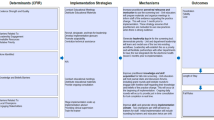Abstract
With increasing efforts to put evidence-based medicine into daily practice, it has become apparent that current ad hoc implementation strategies do not result in desired outcomes. There is a need to evaluate and further develop evidence-based implementation strategies that are effective and efficient. To begin this effort, the authors recognize the importance of integrating implementation into program development rather than treating it as an afterthought to be achieved through promotion and encouragement. Reviewing three empirical frameworks, derived from experience with continuous quality improvement (CQI) programs, guideline and practice change implementation, and disease management programs, the authors identify four key factors for successful program development and implementation. The four factors are: aligning the program with the strategic goals of the organization; obtaining active senior leadership commitment, including allocated resources; securing the appropriate infrastructure to facilitate integration of recommended actions into daily practice; and setting up systematic communications with all involved stakeholders. The authors reviewed randomized clinical trials that compared single and combined implementation approaches to determine whether experimental results would confirm the empirical findings. The results of these clinical trials demonstrated that when organizational commitment, in the form of allocating sufficient resources and/or providing a facilitating infrastructure, is lacking, programs are not successfully implemented. The studies did not explicitly evaluate the concept of strategic alignment of goals or communication strategies. Considering these findings, the authors wonder whether it is worthwhile to develop programs in settings that lack the major success factors, since they are likely to fail to be implemented widely. Before reaching this conclusion, they recommend more research to identify more clearly the nature of the success factors and their relative importance in achieving the desired outcomes of disease management programs.






Similar content being viewed by others
References
Demakis J, McQueen L, Kizer K, et al. Quality Enhancement Research Initiative (QUERI): A collaboration between research and clinical practice. Med Care 2000; 38 (6 Suppl. 1): I17–I25
Krein S, Hayward RA, Pogach L, et al. Department of Veterans Affairss’ Quality Enhancement Research Initiative for Diabetes Mellitus. Med Care 2000; 38 (6 Suppl. 1): I38–I48
Davis, DA, Taylor-Vaisey A. Translating guidelines into practice: a systemic review of theoretic concepts, practice experience and research evidence in the adoption of clinical practice guidelines. CMAJ 1997; 157: 408–16
Cabana MD, Rand CS, Powe NR, et al. Why dons’t physicians follow clinical practice guidelines?. A framework for improvement. JAMA 1999; 282: 1458–65
Bero LA, Grilli R, Grimshaw JM, et al. Getting research findings into practice. Closing the gap between research and practice: an overview of systematic reviews of interventions to promote the implementation of research findings. BMJ 1998; 317: 465–8
National Health Service Centre for Reviews and Dissemination. Getting evidence into practice. Effective Health Care 1999; 5(1): 1–16
National Health Service Centre for Reviews and Dissemination. Implementing clinical practice guidelines. Effective Health Care 1994; 1(8): 1–12
Davis DA, Thomson MA, Oxman AD, et al. Changing physician performance: a systematic review of the effect of continuing medical education strategies. JAMA 1995; 274: 700–5
Grol R, Grimshaw J. Evidence-based implementation of evidence-based medicine. Joint Comm J Qual Improv 1999; 25(10): 503–13
Shortell SM, Bennett CL, Byck GR. Assessing the impact of continuous quality improvement on clinical practice: what will it take to accelerate progress. MilbankQ 1998; 76: 593–624
Shortel SM, Gillies RR, Anderson DA. In: Remaking health care in America. San Francisco: Jossey Bass, 1996
Shortell SM, Os’Brien JL, Carman JM, et al. Assessing the impact of continuous quality improvement/total quality management: concept versus implementation. Health Services Res 1995; 30: 377–401
Solberg LE, Brekke ML, Fazio C, et al. Lessons from experienced guideline implementers: attend to many factors and use multiple strategies. Joint Comm J Qual Improv 2000; 26: 171–88
Models of Care™. Report series and best practices database [online]. Available from URL: http://www.modelsofcare.com [Accessed 2001 Sep 4]
Goldberg HI, Wagner EH, Fihn SD, et al. A randomized controlled trial of CQI teams and academic detailing: can they alter compliance with guidelines? Joint Comm J Qual Improv 1998; 24: 130–42
Brown JB, Shye D, McFarland BH, et al. Controlled trials of CQI and academic detailing to implement a clinical practice guideline for depression. Joint Comm J Qual Improv 2000; 26: 39–54
Wells KB, Sherbourne C, Schoenbaum M, et al. Impact of disseminating quality improvement programs for depression in managed primary care: a randomized trial. JAMA 2000; 283: 212–20
Carney PA, Dietrich AJ, Keller A, et al. Tools, teamwork, and tenacity: an office system for cancer prevention. J Fam Pract 1992; 35: 388–94
Ockene IS, Hebert JR, Ockene J. Effect of training and a structured office practice on physician-delivered nutrition counseling: the Worcester-area trial for counseling in hyperlipidemia (WATCH). Am J Prev Med 1996; 12: 252–8
McBride P, Underbakke G, Plane MB, et al. Improving prevention systems in primary care practices: The Health Education and Research Trial (HEART). J Fam Pract 2000; 49: 115–25
Acknowledgements
Dr. Arozullah is currently supported through a Research Career Development Grant from the Health Services Research and Development Services of the Department of Veterans Affairs.
Author information
Authors and Affiliations
Corresponding author
Rights and permissions
About this article
Cite this article
Heller, C., Arozullah, A. Implementing Change. Dis-Manage-Health-Outcomes 9, 551–563 (2001). https://doi.org/10.2165/00115677-200109100-00004
Published:
Issue Date:
DOI: https://doi.org/10.2165/00115677-200109100-00004




